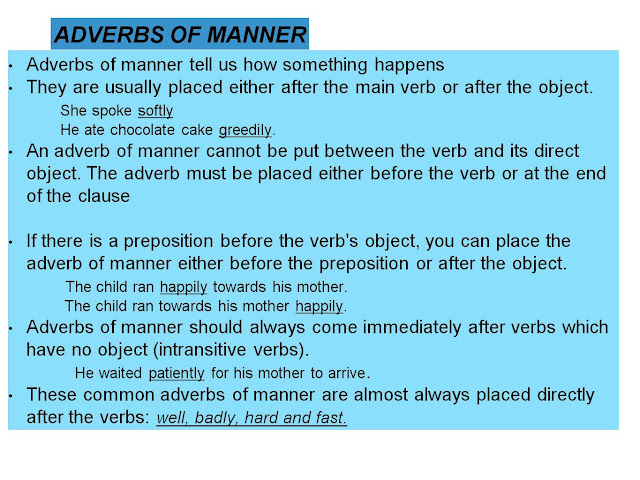martes, 28 de noviembre de 2017
lunes, 20 de noviembre de 2017
domingo, 19 de noviembre de 2017
Adverbs of MANNER and DEGREE
To download this as a pdf click here
Adverbs are
words that can describe:
·
verbs → Read the instructions carefully.
·
adjectives
→
I am terribly sorry about what happened.
·
other
adverbs →
He speaks very quickly.
·
whole sentences → Apparently, he has forgotten our appointment.
|
TYPES OF ADVERBS
|
|||
There are different types of adverbs:
· Adverbs of manner How? happily
· Adverbs of place Where? here
· Adverbs of time When? today
· Adverbs of frequency how
often? always
· Adverbs of degree How (adverb)? very
· Sentence
adverbs How (sentence)? hopefully
|
||||
ADVERBS OF
MANNER
|
§ Adverbs of manner
answer questions beginning with How…?
§ How does she speak?
She speaks loudly.
|
|||
FORM
|
POSITION
|
|||
 |
∙After the main verb if there is
no direct object.
He
sings badly.
·
∙After the direct
object.
She
did her homework quietly.
∙Some adverbs are always after the verb (well,
badly, hard, fast)
The
team played well.
∙More than one verb.
The
teacher quietly asked the children to finish their game.
The
teacher asked the children to finish their game quietly.
|
|||
ADVERBS WITH AND WOTHOUT
-LY
|
HARD
– with effort
HIGH
– opposite of low.
LATE
– opposite of early
NEAR
– oppsite of far
WIDE
– opposite of narrow
|
HARDLY
- scarcely
HIGHLY
– very, very well
LATELY-
recently
NEARLY
- almost
WIDELY
– commonly
|
||
ADVERBS OF
DEGREE
|
§ Adverbs of degree
are used to show the degree to which somebody or something has a
characteristic.
§ It is really cold this morning.
|
|||
TYPES
|
POSITION
|
|||
Some adverbs of
degree are:
Hardly, nearly,
almost, very, really, much, fairly, quite, rather, pretty, extremely, incredibly, a bit, slightly…
|
They
appear before
the adjective or the adverb they modify.
He is a rather clever boy.
She dances quite well.
If
they modify a verb, they go:
·
Before the main verb.
I slipped and nearly fell.
·
After auxiliary verbs, modal verbs and the verb to be.
He can hardly see without his glasses.
|
|||
jueves, 16 de noviembre de 2017
lunes, 13 de noviembre de 2017
-ED Endings pronunciation
In this chart you can see the different ways the -ed is pronounced depending on the sound the verb ends in its bare infinitive form.
miércoles, 8 de noviembre de 2017
Suscribirse a:
Entradas (Atom)








